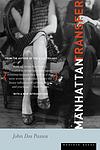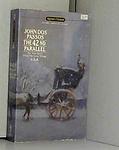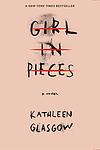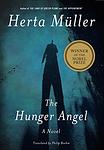The Greatest "Modernist, Social & Cultural Fiction, Fiction, Historical fiction" Books Since 1900
Click to learn how this list is calculated.
This list represents a comprehensive and trusted collection of the greatest books. Developed through a specialized algorithm, it brings together 305 'best of' book lists to form a definitive guide to the world's most acclaimed books. For those interested in how these books are chosen, additional details can be found on the rankings page.
Genres
Modernist literature is a category of books that emerged in the early 20th century, characterized by a break from traditional literary forms and a focus on individual experience and perception. Modernist writers experimented with language, form, and structure, often using stream-of-consciousness narration and fragmented storytelling to convey the complexity and ambiguity of modern life. Themes of alienation, disillusionment, and the search for meaning are common in modernist literature, which reflects the cultural and social upheavals of the time. Overall, modernist literature is a challenging and thought-provoking genre that continues to influence contemporary literature and culture.
Social & Cultural Fiction is a literary category that encompasses novels and stories that delve into the complexities of society and culture, exploring themes such as class, race, gender, and identity within specific social contexts. These narratives often provide a lens through which readers can examine the intricacies of human relationships and the impact of cultural norms and societal structures on individuals and communities. By offering a fictional yet reflective portrayal of real-world social dynamics, this genre invites readers to gain a deeper understanding of the diverse experiences that shape our world. Authors in this category frequently use their characters and settings to comment on contemporary issues, challenge prevailing ideologies, and provoke thought about the possibility of social change, making Social & Cultural Fiction a powerful tool for empathy and a mirror for the ever-evolving human condition.
Historical fiction is a genre of literature that combines fictional stories with real historical events, settings, and characters. These books often take place in a specific time period and are based on research and factual information, but also include imaginative elements to create a compelling narrative. Historical fiction allows readers to experience the past in a unique and engaging way, while also providing insight into the social, cultural, and political issues of the time.
Countries
Date Range
Reading Statistics
Click the button below to see how many of these books you've read!
Download
If you're interested in downloading this list as a CSV file for use in a spreadsheet application, you can easily do so by clicking the button below. Please note that to ensure a manageable file size and faster download, the CSV will include details for only the first 500 books.
Download-
1. The Sound and the Fury by William Faulkner
The novel is a complex exploration of the tragic Compson family from the American South. Told from four distinct perspectives, the story unfolds through stream of consciousness narratives, each revealing their own understanding of the family's decline. The characters grapple with post-Civil War societal changes, personal loss, and their own mental instability. The narrative is marked by themes of time, innocence, and the burdens of the past.
The 21st Greatest Book of All Time -
2. The Magic Mountain by Thomas Mann
In this novel, the protagonist, a young, ordinary man, visits his cousin at a tuberculosis sanatorium in the Swiss Alps. Intending to stay for only a few weeks, he ends up remaining there for seven years, becoming a patient himself. The book explores his experiences and relationships with other patients and staff, delving into philosophical discussions on life, time, and the nature of disease. It also provides a vivid portrayal of the European society and intellectual life on the eve of World War I.
The 43rd Greatest Book of All Time -
3. Absalom, Absalom! by William Faulkner
This novel is a complex narrative about Thomas Sutpen, a poor white man who rises to power in the South, aiming to create a dynasty that would rival the old aristocratic families. However, his ambitions are thwarted by his own flawed decisions and the overarching racial and societal tensions of the era. The story is not told in a linear fashion but rather through a series of interconnected flashbacks and narratives, offering different perspectives on the same events. The book explores themes of family, class, race, and the destructive power of obsession.
The 56th Greatest Book of All Time -
4. U.S.A. Trilogy by John Dos Passos
The U.S.A. Trilogy is a series of three novels that chronicle the lives of various characters in the first half of the 20th century in the United States. The narrative intertwines the stories of twelve characters as they navigate the societal changes and upheavals of the era, including World War I, the Great Depression, and the rise of Hollywood. The author uses a unique narrative technique that combines traditional prose, newspaper-style headlines, biographies, and stream-of-consciousness writing to paint a vivid picture of American life during this period.
The 202nd Greatest Book of All Time -
5. Death of Virgil by Hermann Broch
The novel explores the final hours of the Roman poet Virgil, who, while on his deathbed, contemplates the value and impact of his life's work, particularly his unfinished epic, the Aeneid. The narrative is a complex, stream-of-consciousness meditation on art, life, and death, with Virgil wrestling with his desire to burn his epic and the emperor's command to preserve it. The book delves into themes of the meaning of human existence, the role of art in society, and the clash between the individual's inner world and the external world.
The 348th Greatest Book of All Time -
6. Manhattan Transfer by John Dos Passos
This novel presents a panoramic view of New York City between the 1890s and the 1920s, capturing the sense of the city through the lives of its inhabitants. The narrative weaves together the stories of numerous characters from diverse backgrounds, including immigrants, businessmen, and bohemians. These characters' lives intersect and diverge, reflecting the dynamism and complexity of the city itself. The city is portrayed as a place of both opportunity and disillusionment, where dreams are both realized and shattered.
The 678th Greatest Book of All Time -
7. The Sleepwalkers by Hermann Broch
"The Sleepwalkers" is a trilogy that explores the psychological transformation and moral decay of German society between 1888 and 1918. The narrative follows three main characters: Joachim von Pasenow, a romantic military officer; August Esch, a pragmatic bookkeeper; and Claus von Pasenow, an intellectual and World War I soldier. The book uses these characters to depict the shift from a stable, traditional society to a modern, aimless one, examining the individual's struggle with societal change and the disintegration of values.
The 877th Greatest Book of All Time -
8. The Moon and the Bonfires by Cesare Pavese
The story follows a man who, after making a fortune in America, returns to his small hometown in Italy after World War II. He finds the place significantly changed, with many of his old friends either dead or drastically different. As he tries to reconcile his memories with the new reality, he also grapples with his own identity and the impact of the war on his home. The narrative explores themes of change, identity, and the lasting effects of war.
The 743rd Greatest Book of All Time -
9. Goodbye to Berlin by Christopher Isherwood
This novel is a semi-autobiographical account of the author's experiences in 1930s Berlin. The protagonist, a young Englishman, observes and documents the lives of a wide range of characters, from the working class to the upper class, all against the backdrop of the rising Nazi regime. The book offers a vivid and poignant portrayal of Berlin and its inhabitants during a time of great political and social upheaval.
The 1025th Greatest Book of All Time -
10. If I Forget Thee, Jerusalem by William Faulkner
The novel is a collection of four related stories, each focusing on a different protagonist. The stories are set in the Southern United States and explore themes of love, loss, and the struggle to survive in harsh circumstances. The characters are often isolated and alienated, struggling with their own personal demons and the harsh realities of their environment. The narrative style is complex and challenging, with frequent shifts in time and perspective, reflecting the fragmented and chaotic nature of the characters' lives.
The 1286th Greatest Book of All Time -
11. The Tree of Man by Patrick White
This novel tells the story of Stan Parker, an ordinary and hardworking man living in the Australian outback. The narrative chronicles his life, including his marriage to Amy, the birth of their two children, and the various struggles they face such as financial hardship, natural disasters, and the challenges of rural life. The book provides a deep and introspective look into the human condition, exploring themes of love, death, faith, and the search for meaning.
The 1562nd Greatest Book of All Time -
12. The Vice-Consul by Marguerite Duras
This novel follows the story of three lonely, dispossessed people in Calcutta, India: a troubled former French diplomat, a young French woman haunted by her past, and a poverty-stricken Indian woman. As their lives intersect, they grapple with desire, despair, and the struggle for redemption. The narrative is a complex exploration of colonialism, privilege, and the human condition, told through the lens of these three characters' tragic and intertwined lives.
The 2443rd Greatest Book of All Time -
13. Summer Will Show by Sylvia Townsend Warner
Set in the 19th century, the novel follows the life of a highborn Englishwoman who, after being betrayed by her husband, decides to live independently. However, she is drawn back into a relationship when her husband's mistress, a French actress, sends for her after he falls ill. The protagonist travels to Paris, where she becomes involved in the 1848 revolution and begins a romantic relationship with the actress. The novel explores themes of gender, sexuality, and social class against the backdrop of a tumultuous historical period.
The 2443rd Greatest Book of All Time -
14. The 42nd Parallel by John Dos Passos
"The 42nd Parallel" is a novel that explores the lives of several characters in the early 20th century United States. The narrative intertwines the stories of five protagonists as they navigate through various historical events and social changes such as labor strikes, World War I, and the Mexican Revolution. The book is notable for its experimental style, which includes the use of "Newsreel" and "Camera Eye" sections that incorporate newspaper clippings, song lyrics, and stream-of-consciousness writing to reflect the chaotic and rapidly changing times.
The 3244th Greatest Book of All Time -
15. Chevengur by Andrey Platonov
The book is a complex and philosophical tale set in the aftermath of the Russian Revolution, exploring the lives of various characters in a small town as they grapple with the utopian ideals of communism and the harsh realities of its implementation. Through the experiences of these characters, including a young revolutionary and a disenchanted wanderer, the narrative delves into themes of human nature, societal transformation, and the search for meaning in a world undergoing radical change. The story's blend of surrealism, poetic language, and political commentary creates a unique and often disquieting examination of the Soviet dream and the disillusionment that followed its pursuit.
The 3652nd Greatest Book of All Time -
16. Go Down, Moses by William Faulkner
This novel is a collection of interconnected stories that explore the complex relationship between race, heritage, and land in the American South. The narrative primarily focuses on the McCaslin family, a family of white landowners, and their relationships with the African American individuals who were formerly enslaved by them. The book explores themes of racial exploitation, inheritance, and the destructive power of obsession, particularly through the character of Ike McCaslin, who renounces his inheritance due to its roots in slavery.
The 4077th Greatest Book of All Time -
17. Coolie by Mulk Raj Anand
"Coolie" is a poignant and powerful novel that delves into the life of Munoo, a young boy from a small village in India who is forced into a life of labor as a coolie. Set during the British colonial era, the story explores themes of exploitation, poverty, and the harsh realities faced by the lower classes. Munoo's journey takes him from his village to bustling cities, encountering both cruelty and kindness along the way, ultimately shedding light on the injustices of the time.
The 8449th Greatest Book of All Time -
18. The Strudlhof Steps by Heimito von Doderer
"The Strudlhof Steps" is a complex and layered novel set in Vienna, spanning from 1908 to 1951. It intricately weaves together the lives of its diverse cast of characters, centered around the eponymous staircase, a significant architectural landmark in the city. The narrative delves into the personal histories, relationships, and existential quests of these characters, capturing the social and political changes occurring through the years. With its rich detail and psychological depth, the novel provides a panoramic view of Viennese life across two World Wars, exploring themes of time, memory, and the human condition.
The 8726th Greatest Book of All Time -
19. In This Our Life by Ellen Glasgow
This novel tells the story of the Timberlake family, focusing on two sisters, Stanley and Roy. Stanley is a selfish, manipulative woman who abandons her husband for her sister Roy's husband, causing a series of tragic events. Meanwhile, Roy, the more responsible and virtuous sister, must navigate the fallout of Stanley's actions. The book explores themes of family, morality, and the destructive power of selfishness, all set against the backdrop of the American South in the early 20th century.
The 10138th Greatest Book of All Time -
20. The Hunger Angel by Herta Müller
"The Hunger Angel" is a poignant novel that explores the harrowing experiences of a young man deported to a Soviet labor camp after World War II. The narrative delves into the psychological and physical toll of life in the camp, where the protagonist grapples with extreme hunger, harsh conditions, and the struggle to maintain a sense of identity and humanity. Through lyrical and evocative prose, the book captures the intense emotions and survival mechanisms of those ensnared in the brutal realities of historical political oppression.
The 10431st Greatest Book of All Time
Reading Statistics
Click the button below to see how many of these books you've read!
Download
If you're interested in downloading this list as a CSV file for use in a spreadsheet application, you can easily do so by clicking the button below. Please note that to ensure a manageable file size and faster download, the CSV will include details for only the first 500 books.
Download


















